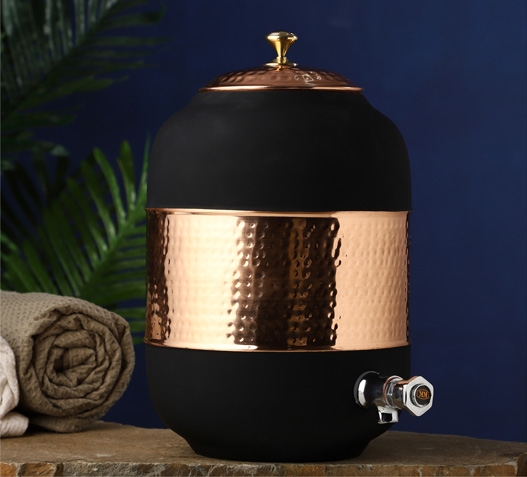Exploring the Flexibility and Resilience of Innovative Copper Products in Modern Design
Exploring the Flexibility and Resilience of Innovative Copper Products in Modern Design
Blog Article
Checking Out the Diverse Applications of Copper Products in Modern Industries
Copper products have actually developed themselves as crucial parts across a myriad of contemporary sectors, mostly because of their amazing conductivity, pliability, and resistance to corrosion. From enhancing the performance of electric systems to playing a vital role in eco-friendly energy technologies, the adaptability of copper is evident. Its recyclability settings it as a lasting option in manufacturing and electronics. As sectors progressively prioritize development and sustainability, the varied applications of copper require a closer exam, especially concerning their potential effect on future technological improvements and environmental methods.
Electric Applications of Copper
Copper is an important material in the electrical industry, representing roughly 60% of the complete need for non-ferrous steels around the world - Copper Products. Its superior electrical conductivity, which is nearly two times that of light weight aluminum, makes it the recommended choice for a variety of electric applications. From circuitry systems in business and property structures to high-voltage power transmission lines, copper makes certain performance and integrity in electricity distribution
In enhancement to circuitry, copper is important to the manufacturing of electrical parts such as generators, motors, and transformers. These parts take advantage of copper's thermal conductivity and malleability, important for heat dissipation and efficient performance. Copper's resistance to deterioration enhances the lifespan and durability of electrical systems, making it an affordable solution in the lengthy term.
The growth of renewable resource sources, such as solar and wind power, has additionally enhanced the demand for copper in electric applications. As markets change in the direction of sustainable energy services, copper's function ends up being much more important. On the whole, the versatility and performance characteristics of copper strengthen its status as a cornerstone material within the electric sector, driving innovation and efficiency across numerous applications.
Pipes and Piping Solutions
In modern-day pipes systems, the option of products substantially influences both capability and durability. Copper has emerged as a preferred option because of its special residential properties, consisting of rust resistance and antimicrobial qualities. These attributes ensure that copper piping continues to be sturdy and secure for transporting safe and clean water, an essential factor to consider in domestic and commercial applications.
Among the essential advantages of copper in pipes is its ability to stand up to heats and pressures, making it suitable for a range of applications, from hot water systems to home heating and cooling networks. Additionally, copper's adaptability permits for less complicated setup in complex piping designs, decreasing the threat of leaks and failings.
An additional noteworthy advantage is copper's lengthy lifespan, usually surpassing half a century with proper upkeep. This longevity not only decreases replacement prices however additionally contributes to lasting techniques by decreasing waste. Copper's recyclability straightens with modern environmental requirements, advertising a round economy within the plumbing sector.
Copper in Renewable Power
The convenience of copper expands beyond plumbing applications, playing a crucial duty in the eco-friendly energy industry. Its exceptional electric and thermal conductivity makes it an essential material in the production and distribution of renewable resource resources, specifically solar and wind power. In photovoltaic panels, copper is made use of in photovoltaic or pv cells and wiring, facilitating efficient energy conversion and transmission. Its resistance to corrosion guarantees resilient performance, which is vital for maximizing energy result over time.

In addition, as the international demand for electric cars (EVs) boosts, copper's duty in battery systems and billing framework becomes even much more considerable. The product's capacity to perform power efficiently is integral to the performance of EV batteries, enhancing variety and charging speed.
Copper's Function in Electronics
Electronics manufacturing relies heavily on copper's extraordinary residential properties, specifically its high electric conductivity and thermal effectiveness. These attributes make copper a suitable option for a variety of electronic components, consisting of adapters, motherboard, and circuitry. The metal's ability to efficiently send electric signals makes sure minimal power loss, which is critical in high-performance digital gadgets.
Moreover, copper's thermal conductivity plays a significant duty in warm dissipation, securing delicate components from overheating. This is especially vital in contemporary electronics, where portable styles lead to raised warm generation. Copper is also preferred for its malleability and ductility, permitting it to be quickly formed into intricate styles that meet the needs of advanced digital applications.
With the rise of customer electronics, telecoms, and electric automobiles, the demand for copper in the electronics field remains to expand. As developments in modern technology develop, copper continues to be essential to attaining higher performance and integrity in electronic products. Its recyclability better enhances its charm, as manufacturers seek lasting solutions without jeopardizing top quality. Thus, copper More Info stays a keystone product in the ever-expanding field of electronics.
Ingenious Utilizes in Manufacturing

One noteworthy application remains in additive manufacturing, where copper-based materials are used in 3D printing procedures. This enables the production of light-weight elements and intricate geometries, particularly in the aerospace and vehicle sectors. Furthermore, copper's thermal conductivity makes it an optimal option for warmth exchangers, boosting efficiency in commercial air conditioning systems.
Additionally, the increase of clever manufacturing has seen the consolidation of copper in IoT tools, where its conductive capacities sustain advanced picking up technologies. In the realm of sustainable power, copper is crucial in the production of solar panels and wind turbines, assisting check over here in extra efficient energy conversion and circulation.
As sectors make every effort for sustainability and innovation, copper's flexibility and performance remain to position it as an important product, driving improvements in production and adding to the growth of smarter, much more effective products.
Conclusion
The indispensable role of copper in eco-friendly energy and its crucial function in electronic devices highlight its value in progressing sustainable techniques. Collectively, these applications show copper's crucial payment to technical development and industrial performance in contemporary culture.
From improving the site effectiveness of electric systems to playing a vital role in sustainable power technologies, the adaptability of copper is obvious. As sectors progressively focus on innovation and sustainability, the diverse applications of copper call for a closer examination, especially concerning their possible impact on future ecological practices and technological improvements.
The development of sustainable energy sources, such as solar and wind power, has additionally raised the demand for copper in electrical applications. Overall, the flexibility and performance attributes of copper strengthen its standing as a keystone material within the electric field, driving development and performance throughout various applications.
The versatility of copper extends beyond plumbing applications, playing a vital role in the renewable energy sector.
Report this page